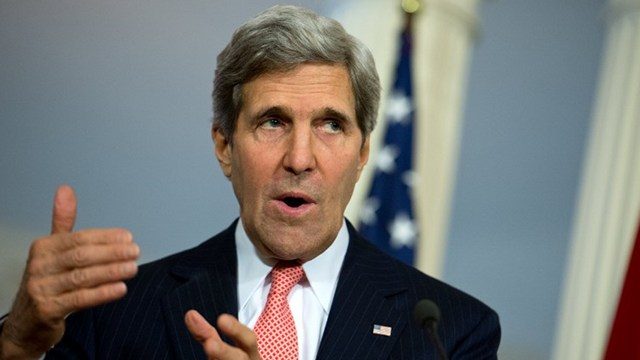SUMMARY
This is AI generated summarization, which may have errors. For context, always refer to the full article.

BAGHDAD, Iraq (UPDATED) – US Secretary of State John Kerry said Wednesday, September 10, in Baghdad that a global coalition will defeat jihadists in Iraq and Syria, hours before President Barack Obama is expected to announce expanded strikes against them.
“We all know – I think we come to this with great confidence – that, ultimately, our global coalition will succeed in eliminating the threat from Iraq, from the region and from the world,” Kerry said.
The top US diplomat said the Iraqi army would be rebuilt as part of the long-awaited strategy against the Islamic State (IS) to be outlined by Obama in a televised address to the nation on Wednesday night.
Iraq’s armed forces “will be reconstituted and trained and worked on in terms of a number of different strategies through the help not just of the United States but of other countries also,” Kerry said.
His remarks came after talks with Iraq’s new leaders on their role in efforts to halt IS since its fighters spearheaded a lightning offensive in June seizing much of the Sunni Arab heartland north and west of Baghdad.
Obama is widely expected to announce the expansion of the month-old US air campaign in Iraq to neighboring Syria, where IS has seized a swathe of the northeast, bordering Iraq.
The US administration has come under mounting criticism for not taking stronger action against IS militants who have committed a spate of atrocities, many of them paraded on the Internet.
Kerry’s visit to Baghdad was the first stop on a regional tour to build support for the new US strategy which he has said would only work with the backing of the “broadest possible coalition of partners”.
He was to fly on to Saudi Arabia for talks on Thursday with 11 regional foreign ministers on a joint campaign against IS.
Locally recruited fightback
US efforts to build a broad coalition had been complicated by the region’s sectarian politics, with Saudi Arabia and other Sunni states deeply suspicious of Baghdad’s Shiite-led government.
But they were boosted Monday by the formation of a new government that Kerry says has the potential to unite Iraq’s diverse communities.
Kerry met new Prime Minister Haidar al-Abadi, a Shiite regarded as far less divisive than his predecessor Nuri al-Maliki, who was criticized for driving many in the Sunni minority into the arms of IS.
US officials have hailed a more constructive approach from Abadi to recapturing Sunni Arab areas from the jihadists after the heavy-handed security tactics of Maliki’s government.
Kerry praised the new premier’s commitment to the sweeping reforms needed, and welcomed the military’s readiness to reconstitute itself for the fightback.
But the scale of the security challenge facing Iraq was underlined by bombs that killed at 19 people in east Baghdad during Kerry’s visit.
Much of the regular army is drawn from Iraq’s Shiite majority who come from Baghdad and the south and are despised outsiders in Sunni areas.
US officials have welcomed the new government’s acceptance that Sunnis need to take charge of the fightback against IS in their own areas.
“Abadi has said repeatedly since he was named the prime minister that he is not going to… take military units from the south and go into areas in the north and west to take on (IS),” a US official told journalists traveling with Kerry.
Instead national guard units “grown from the provinces… locally recruited,” will take the “primary security responsibility” for the fightback in the five provinces where IS fighters hold sway in Sunni areas.
In his speech, Obama is expected to steel Americans for a prolonged battle against the jihadists, despite devoting much of his presidency to avoiding new entanglements in the Middle East.
Syria air strikes?
But wary of repeating what he believes were the mistakes of the past decade, Obama is expected to renew his pledge not to send ground troops back to Iraq.
Both the New York Times and the Washington Post said Obama was preparing to authorize the expansion of the air campaign against IS that he launched in Iraq on August 8 to neighboring Syria.
An opinion poll published on Tuesday suggested 65 percent of Americans would approve such an expansion of strikes, which would be without the authorization of the Damascus government.
But Brussels-based think-tank the International Crisis Group warned “the resulting boost to IS recruitment might outweigh the group’s tactical losses”.
Washington has pinned its hopes of pegging back IS in Syria on rebel groups opposed to the jihadists, baulking at cooperation of any sort with the regime of President Bashar al-Assad whose overthrow it has supported since 2011.
But the main anti-jihadist rebel alliance suffered a major blow late Tuesday when a blast in the northwest killed 47 of its top commanders. – Rappler.com
Add a comment
How does this make you feel?
There are no comments yet. Add your comment to start the conversation.